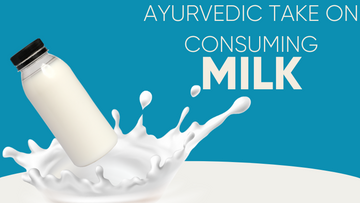
Milk, according to Ayurveda, provides special and unique nutrition that cannot be obtained from any other food. Milk, when properly digested, nourishes all tissues, promotes balanced emotions, and aids in the balance of all doshas. According to Ayurveda, it brings strength, immunity, and satisfaction. As a result, milk is an essential food to include regularly in one's diet, especially if one lives a vegetarian lifestyle.
Milk Holds A Special Place In Ayurveda.
According to Ayurveda, there are specific times of the day when you should drink milk to reap the most benefits, and when you should avoid it entirely. There are two schools of thought: if you want milk to build your body, you should drink it in the morning; otherwise, you should drink it at night.
For added benefits, combine it with a tonic such as an Ashwagandha, which improves sleep and memory, or Triphala, which is good for your eyes. According to Ayurveda, milk is one of the best foods, and everyone should consume it daily, at any time. Ayurveda is against consuming milk in the form of milkshakes. According to experts all sour fruits, bananas, mangoes, and melons, should never be blended with milk or yogurt.
Milk often referred to as a complete food, is an essential component of the Indian diet. Milk is one of the most nutritious beverages available, containing nutrients such as protein, Vitamin A, B1, B2, B12, and D, potassium, and magnesium. Milk is also valuable in Ayurveda for its nutritional and digestive properties. But, according to Ayurvedic wisdom, to reap the full benefits of milk, one must know how to drink it:
Ayurveda for the longest time has espoused the idea of having milk during the night for its digestive and sedative properties. You may want to have your glass of milk late in the evening to be on the safer side. Either way, you must never miss out on having this wondrous beverage. There will be more on this to continue with where we will understand what and what not to combine with milk.
Milk is recommended by Ayurveda for all healthy people of all ages because it balances Vata and Pitta doshas while increasing Kapha dosha.
When Should Milk Be Consumed?
Morning Time - This boosts the body's strength, provides nourishment, and is beneficial to those looking to gain weight. If drinking milk for breakfast makes you feel sluggish, heavy, dull, or causes acidity, you should avoid it.
Midday Time - improves appetite, increases strength, and aids those suffering from difficult or painful urination and kidney stones. It is especially advised for children.
Night Time - Milk balances all three doshas. There should be at least 30 minutes between dinner and the time you go to bed.
Warm Milk Or Cold Milk?
Only warm milk is recommended by Ayurveda; cold milk is not.
When Should Milk Be Avoided?
Fever, indigestion, cough, increased Kapha dosha in the body, diarrhea, certain skin diseases, and intestinal worms are all symptoms of a fever.
Some Interesting Facts About Milk
- Last year, India produced 22% of total global milk output.
- There are 40 indigenous cattle breeds in India, including the Gir, Sahiwal, and Red Sindhi, as well as 13 local buffalo breeds.
- Surprisingly, lactose intolerance affects approximately 65% of the global population.
- Milk is also high in vitamin A, magnesium, zinc, and thiamine (B1).
- Milk fat is one of the most complex natural fats, with over 400 different types of fatty acids.
Some people, regardless of doshas, are lactose intolerant, which means they have a partial or total inability to digest lactose, which can cause abdominal pain, bloating, and diarrhea after consuming milk and other dairy products. This is caused by a lack of the enzyme lactase. To understand this individually you should consume or not or any sort of query you can consult your family doctor first, or you can contact our Health Expert or connect us at +919867667699 to obtain the most accurate diagnosis.




